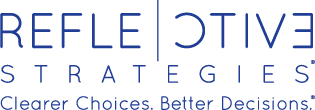Good advisers look closely at your needs and give back to you an impression of what they see, hear, and sense, clarifying aspects of your situation that may not have been visible before. They filter what’s happening through their own prism of training and experience, hopefully with enough self-knowledge to ensure they’re providing objective counsel.
For example, your lawyer considers who you are, the facts and circumstances of your case, the prevailing laws, the mechanics of the justice system, the vagaries of human judgment, and the possible consequences of what might happen to you. (S)he knows that no two cases are the same. Through an iterative and structured process, (s)he makes a recommendation that reflects all these variables and then works with you to plot the best course and navigate through it. Good business advisers work this way, too.
The term reflection also captures a vitally important aspect of leadership—the ability to deeply know our own and others’ thoughts, wants, needs, and intentions before making a decision. In an era of rapid fire sensory assault, this just isn’t happening. Yet we wonder why we’re failing to connect with one another, to find common ground, and to work together to fix our shared problems. Finding time to reflect is more important than ever before.
If we really reflect on our own situations, we improve the odds of thinking and acting in ways that increase the likelihood that we’ll decide wisely for ourselves and others.
But time, of course, is tight. I’ve been a bottom line executive and understand the real pressures of planning and decision making under intense organizational and often public scrutiny. I don’t waste my clients’ time with anything that we don’t mutually believe may help to clarify choices and make better decisions. I meet you where you are—starting with your problem and working with you to shape a project suited to your unique conditions.
I serve both for profit and not-for-profit organizations for several reasons.
I’ve worked extensively in both sectors at many levels—from the front line to the boardroom—and can bring deep knowledge and experience from these roles.
I believe that greater sharing of experiences, insights, and innovations among these sectors makes for better decisions all around. While there are important commonalities, there are also unique aspects to leading a social enterprise that make it especially challenging to achieve results. I want to help to improve the social sector’s ability to address some of the challenges that affect all our lives.
Some of the most innovative practices in health and human services are emerging from start-ups and mid-cap (less than $1 billion in revenue) organizations. I’m especially optimistic about these parts of the economy catalyzing growth. I also believe that smaller and mid-sized organizations would benefit most from the Reflective Strategies® approach to problem solving.
I have been part of the healthcare ecosystem now for about a dozen years, and, before that, I worked in the pharmaceutical and medical technology sectors. I understand these environments and highly value and respect the life-saving and life-altering work done there every day. My family and I have been very frequent consumers and observers of healthcare. As a grant maker I’ve invested in it. And I’ve served on healthcare-related advisory and fiduciary boards since the mid 90’s, leading a $200 million healthcare enterprise.
But healthcare delivery isn’t what it needs to be in terms of access, affordability and quality. It cannot continue to be this way for us and for the people we love. We’re starting to see a positive shift in the primacy of the customer—patients and their families— and the spread of technology at the enterprise and individual levels that will transform health, wellness, and the care we receive. It’s exciting to be even a very small part of this.
Mindfulness brings awareness that we are not our thoughts; that we can make better decisions by not constantly (and, often erroneously) judging our situations, ourselves and others; and that we must find ways to accept the circumstances we’re in in order to focus on what we can actually control. These insights are liberating at both the personal and professional levels.
Integrating the increasingly validated practices of mindfulness into how we work offers the possibility of bringing greater awareness into those activities that consume most of our waking hours. I especially believe that the stresses and strains of working on the front lines of healthcare can be lessened in this way.


